
The Health to Wealth Movement was not built from theory it was forged through lived experience. After examining my own struggles, patterns, and breakthroughs, five core foundations emerged. These pillars form a framework for reclaiming physical vitality, mental clarity, inner alignment, and purposeful legacy. This is not about chasing success. It’s about building a life you actually want to live.
Read more...
Discover the transformative power of the Health to Wealth Movement, a philosophy that challenges the empty pursuit of material success and reveals a deeper path to true fulfillment. In a world obsessed with external achievements, many find themselves battling inner emptiness, anxiety, and disconnection despite their outward gains. This movement returns to essential principles, emphasizing how nurturing your mental, physical, and spiritual roots can unlock lasting clarity and purpose. Explore how aligning your inner world with your actions creates genuine freedom and success, without sacrificing your authentic self. Dive deeper into this compelling approach and uncover the tools to reclaim your life in ways that truly matter.
Read more...
In a world where silence is often mistaken for strength, countless men are suffocating under the weight of unspoken emotions, conditioned from a young age to "man up" and "deal with it." As societal pressures mount, this culture of silence has reached a breaking point, manifesting in a staggering number of untreated mental health issues, strained relationships, and physical ailments. Yet, the path to reclaiming true strength does not lie in isolation, but in breaking this silence and embracing authenticity. The journey is akin to building physical fitness, where even small breakthroughs in emotional expression significantly enhance resilience and life quality. The time has come to challenge entrenched stereotypes and redefine masculinity by pairing strength with openness, ultimately forging connections that empower rather than isolate. Discover how small acts of courage in communication can lead to profound transformations, inviting a fresh narrative of what it truly means to be strong.
Read more...
Uncovering the essence of who you truly are begins by asking a deceptively simple question: "What do you stand for?" This blog post delves into the core of masculinity, challenging men to define their values, transcend societal expectations, and reject outdated stereotypes. It encourages introspection into foundational beliefs that guide behaviors and decisions, and it addresses the quiet struggles faced by many men and boys today. With guidance on how to identify your core principles and live with purpose and integrity, the post is a call to action for those ready to stop drifting through life and start living a life true to their values. Discover how aligning your actions with your convictions can transform aimless wandering into a purposeful journey, and explore steps that can build a legacy of strength, integrity, and conviction. Begin this exploration and redefine what success truly means to you.
Read more...
Ever felt a disconnect between the life you're leading and the person you truly are? This feeling, often beginning with subtle unease or an undeniable gut punch, signals the starting point of an empowering journey inward. By examining your values and beliefs—those deep-seated drivers shaped by experiences, culture, and upbringing—you can reveal the authentic you, hidden beneath layers of societal expectations and self-imposed narratives. Through conscious reflection, you begin to understand which beliefs empower or restrict you, and redefine them to align with your true identity. Discovering your core values acts as your internal compass, guiding you to live with integrity and purpose. If you’re ready to break free from outdated narratives and embrace the strength of your true self, this journey promises profound transformation, one intentional step at a time. Dive deeper into the path of inner alignment and discover how to reclaim your strength from within.
Read more...




